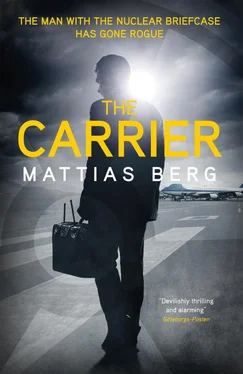Mattias Berg - The Carrier
Здесь есть возможность читать онлайн «Mattias Berg - The Carrier» весь текст электронной книги совершенно бесплатно (целиком полную версию без сокращений). В некоторых случаях можно слушать аудио, скачать через торрент в формате fb2 и присутствует краткое содержание. Город: London, Год выпуска: 2019, ISBN: 2019, Издательство: MacLehose Press, Жанр: Триллер, на английском языке. Описание произведения, (предисловие) а так же отзывы посетителей доступны на портале библиотеки ЛибКат.
- Название:The Carrier
- Автор:
- Издательство:MacLehose Press
- Жанр:
- Год:2019
- Город:London
- ISBN:978-0-85705-788-4
- Рейтинг книги:4 / 5. Голосов: 1
-
Избранное:Добавить в избранное
- Отзывы:
-
Ваша оценка:
- 80
- 1
- 2
- 3
- 4
- 5
The Carrier: краткое содержание, описание и аннотация
Предлагаем к чтению аннотацию, описание, краткое содержание или предисловие (зависит от того, что написал сам автор книги «The Carrier»). Если вы не нашли необходимую информацию о книге — напишите в комментариях, мы постараемся отыскать её.
The Carrier — читать онлайн бесплатно полную книгу (весь текст) целиком
Ниже представлен текст книги, разбитый по страницам. Система сохранения места последней прочитанной страницы, позволяет с удобством читать онлайн бесплатно книгу «The Carrier», без необходимости каждый раз заново искать на чём Вы остановились. Поставьте закладку, и сможете в любой момент перейти на страницу, на которой закончили чтение.
Интервал:
Закладка:
Flanders rolled by like a newsreel from the First World War. The same special clay which made the unusually deep and durable trenches possible, the deadlock, the same unceasing rain. It spattered ever harder against the window as the train took me further into this featureless part of the world, as if made to house in the greatest secrecy one of our key nuclear weapons bases in Europe. The sort of thing that we never confirmed, however strong the indications were.
I ticked off the names of all the artistically decorated station buildings on the Post-it note the woman in the ticket office at Bruxelles-Central had given me. Tienen , Landen , Sint-Truiden , Alken… And oddly enough there was a taxi available outside the station in Hasselt. Despite the rain, on this day of all days.
“Spotters’ Day?” the driver asked. “To the base?”
“No,” I said, “first a good night’s sleep at the hotel. I’ll take the risk of waiting till tomorrow to get myself there.”
The driver hardly spared a glance at the kitschy decals on my enormous black backpack, which I lifted into the car with me. He spoke English as well as most people do around our overseas bases, knew that it was worth making that little effort. And that he should not ask any more questions than necessary.
So it was mostly him telling me. About what was obviously the reason Ingrid had been expecting Sixten on that particular day in Kiruna, so as to have enough time to come down here for this very occasion. The moment when everybody would be gazing in the wrong direction. “Misdirection”, as magicians call it. When aircraft enthusiasts from the entire town, country, continent would be gathered for the one time in the year when one can see the airplanes in action at really close quarters. Our propaganda machinery in full swing.
“And it’ll be especially spectacular this year, as you know! The whole area is super excited that this time they’ll not only be allowed into the N.A.T.O. base, but the real one, right inside, so that the Americans can show everybody there are no nuclear weapons there. People are also speculating that something completely new is going to be demonstrated. The spotters have been standing in line for days—and the activists for even longer. Even though the gates won’t be opened until seven tomorrow evening.”
I glanced at the clock on the taxi dashboard: almost 4.00 p.m., the day before. Immediately before the first sign, VLIEGBAS , I began to recognize where I was, even as a car passenger. To kill some time I asked the driver to take a swing around the base. The area by the placard which read Kiezel Kleine Brogel Spotters Corner was for once totally empty. The enthusiasts who normally stood there for most of the day, gazing into the sky, since our fighters’ take-off and landing times were classified even during training, must have moved over to the base itself.
Through the taxi window I looked at the encampment outside the gates. The rain had stopped, and enormous pools of water lay mirror-like. The tents of the demonstrators and enthusiasts stood not too far apart, united by a common interest. In the calm before the storm.
Then I let my eyes travel further: across the sentry box; the high walls; the razor-wire fence which had been developed for Guantanamo and continually refined for our nuclear weapons bases around the world. I had been here so often, very recently, in another life. The Kleine Brogel nuclear weapons base was one of our central locations in Europe for exercises. As well as one of the keys to our complex intercontinental system of attack and counter-attack, in case events turned real. What went by the name “Global Strike” in our current war plan.
When I felt that I had reconnoitered enough, I asked the driver to take a detour past the fighter plane on the roundabout on the way to Peer. Our old F-16, one of our longest-lasting models, part of the classic old weapons system which was gradually going to be replaced as part of the “Revitalization”. According to current plans, with effect from 2023.
As we approached the hotel, I had a hollow feeling in the pit of my stomach: even I was not immune to it. There was no way of knowing what would be waiting for me there. If Ingrid and Jesús María could have survived the attack in Suite 325. Whether I had been spared just to act as what we call a “spool of thread”. Somebody one allows to run free, under constant surveillance, to see where the leads run and how many people are involved. How deep it all goes. How high up, so that everyone is identified—even myself.
“Will you fetch me tomorrow late afternoon, at 6.30 p.m.?” I asked the driver.
“Of course, sir.”
The facade of the hotel was the same as ever, a piece of cultural history, military memorial, frozen time. The neon sign said “1815”, the name of the hotel honoring the battle at Waterloo—one hour from here by the main road. Where even Napoleon was defeated.
The woman in reception looked the same too. Her name badge identified her as Valeria—in our military way we had called her Valkyria behind her back, because of her long blond hair and luxuriant figure—and she had clearly had some more work done to her face since I last saw her.
Yet when I handed over my passport she hardly looked up. Maybe because she simply did not recognize me after my own surgery. Or because she had a lot on her hands.
The lobby was packed with spotters. In many ways hard to distinguish from the various sorts of spies, not least our own, who always turned up when bases around the world opened their gates.
But in one respect the two groups differed markedly. The enthusiasts’ binoculars were enormous, and stuck out of their backpacks, a status symbol of sorts: the bigger, the better. This was in stark contrast to the spies’ smaller models, chosen in order not to arouse attention.
In some ways therefore I blended in among the enthusiasts with my large black hybrid, even my kitschy tourist decals had their equivalent on some backpacks—but in one decisive respect I did not at all. Valeria pounced on this like a hawk when she finally looked up from her computer.
“But where are your binoculars, Herr Gustafsson?”
“Oh, I was robbed on the way here, unfortunately. In my sleeping compartment. But I’ll able to borrow from a friend. He’s been here for a few days already, to get a good place in line because of the rumors about something spectacular tomorrow evening.”
“And you think you’ll be able to find each other among all the people waiting to get in?”
“It usually works out, with a bit of ingenuity. It’s not our first time.”
She gave me a searching look, could very well have been paid by our military command, to keep an eye on things. Then she gave me my room key.
4.04
I checked out just after 9.00 a.m., before having breakfast. Valeria still showed no sign of seeing through my new face, just nodded and hummed into the computer. The dining room was empty, all the spotters up with the dawn to stand in line at the base. There was a chance that Ingrid might be among them. If, that is, she was still alive. I picked up a couple of newspapers and loaded my plate with sausage, bacon and potato pancakes, knew I needed the nourishment since I had not had a proper meal for more than twenty-four hours.
I left the plate half empty, or half full. When the tourist bureau next to the hotel opened, I showed them my passport and in return was given my own key to the Bruegelhuis and a bulky black audio guide.
“So you like Bruegel, Herr Gustafsson?” the young girl at the counter asked in a broad Flemish accent.
“Actually not. He scares the living daylights out of me.”
The girl stiffened. She did not know how she should handle this response, what to do with herself in her traditional outfit from this province, Limburg: the strange white kerchief and appliqué fabric flowers, the black blouse and lilac striped skirt with orange fabric sewn onto it. With her studied politeness, her language skills, her training in tourism at the local university.
Читать дальшеИнтервал:
Закладка:
Похожие книги на «The Carrier»
Представляем Вашему вниманию похожие книги на «The Carrier» списком для выбора. Мы отобрали схожую по названию и смыслу литературу в надежде предоставить читателям больше вариантов отыскать новые, интересные, ещё непрочитанные произведения.
Обсуждение, отзывы о книге «The Carrier» и просто собственные мнения читателей. Оставьте ваши комментарии, напишите, что Вы думаете о произведении, его смысле или главных героях. Укажите что конкретно понравилось, а что нет, и почему Вы так считаете.












